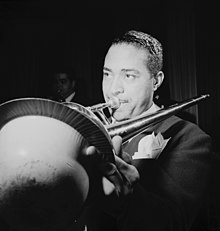Dicky Wells
Dicky Wells | |
|---|---|
 Photo of Wells by William P. Gottlieb | |
| Background information | |
| Birth name | William Wells |
| Born | June 10, 1907 Centerville, Tennessee, U.S. |
| Died | November 12, 1985 (aged 78) New York City |
| Genres | Jazz |
| Occupation | Musician |
| Instrument | Trombone |
William Wells (June 10, 1907 – November 12, 1985), known professionally as Dicky Wells (sometimes Dickie Wells), was an American jazz trombonist.[1][2]
Career
[edit]Dicky Wells is believed to have been born on June 10, 1907, in Centerville, Tennessee.[3] His parents were Florence and George Washington Wells. At age 10, his stepfather Felix Murray moved the family to Louisville, Kentucky;[4][5] there he attended Central High School.[6] His brother was trombonist Henry Wells. Dicky moved to New York City in 1926, and became a member of the Lloyd Scott band.[3]
He played with Count Basie between 1938 and 1945 and 1947–1950.[3] He also played with Cecil Scott, Spike Hughes, Fletcher Henderson, Benny Carter, Teddy Hill, Jimmy Rushing, Buck Clayton and Ray Charles.[3] In the middle years of the 1960s, Wells toured and performed extensively, and the onset of alcoholism caused him personal problems which led to his semi-retirement. Publication of his autobiography in 1973 helped to steer Wells back to his profession.[3]

In his later years, Wells suffered a severe beating during a mugging that affected his memory, but he recovered and continued to perform.[3] He played frequently at the West End jazz club at 116th and Broadway, most often with a band called The Countsmen, led by alto saxophonist Earle Warren, his colleague from Count Basie days. A trademark of Wells was his "pepper pot" mute, which he made himself.
Death
[edit]
Wells died of cancer on November 12, 1985, in New York City.[3] Shortly after his death, Wells's family donated his trombone to the Rutgers University Institute of Jazz Studies.
Discography
[edit]As leader
[edit]- Bones for the King (Felsted, 1958)
- Trombone Four-in-Hand (Felsted, 1959)
- Chatter Jazz with Rex Stewart (RCA Victor, 1959)
- Heavy Duty! (Vocalion, 1965)
- Dicky Wells in Paris 1937 (Prestige, 1968)
- Lonesome Road (Uptown, 1981)
- The Stanley Dance Sessions (Lone Hill, 2005)
- Dicky Wells with the Alex Welsh Band (Jazzology, 2011)
As sideman
[edit]With Count Basie
- Blues by Basie (Columbia, 1956)
- The Count (RCA Camden, 1958)
- The Count Swings Out (Coral, 1959)
With Buck Clayton
- Songs for Swingers (Columbia, 1959)
- Goin' to Kansas City (Riverside, 1960)
- One for Buck (Columbia, 1962)
- Copenhagen Concert (SteepleChase, 1979)
With Jimmy Rushing
- The Jazz Odyssey of Jimmy Rushing (Philips, 1957)
- Little Jimmy Rushing and the Big Brass (Columbia, 1958)
- Every Day I Have the Blues (Bluesway, 1967)
- Livin' the Blues (Bluesway, 1968)
With others
- Vic Dickenson & Joe Thomas, Mainstream (Atlantic, 1958)
- Dizzy Gillespie, The Complete RCA Victor Recordings (Bluebird, 1995)
- Tommy Gwaltney, Goin' to Kansas City (Riverside, 1960)
- Nancy Harrow, Wild Women Don't Have the Blues (Candid, 1961)
- John Lee Hooker, It Serve You Right to Suffer (Impulse!, 1966)
- Spike Hughes, Spike Hughes and His All American Orchestra (London 1933 1956)
- Frankie Laine & Buck Clayton, Jazz Spectacular (Columbia, 1956)
- Jay McShann, The Big Apple Bash (Atlantic, 1979)
- Red Prysock, Fruit Boots (Mercury, 1957)
- Rex Stewart, Henderson Homecoming (United Artists, 1959)
- Buddy Tate, Swinging Like Tate (Felsted, 1958)
References
[edit]- ^ "Dicky Wells | American musician". Encyclopedia Britannica. November 8, 2023.
- ^ "Dicky Wells biography". Biography.com. Archived from the original on January 3, 2013. Retrieved October 29, 2013.
- ^ a b c d e f g Colin Larkin, ed. (2002). The Virgin Encyclopedia of Fifties Music (Third ed.). Virgin Books. p. 484. ISBN 1-85227-937-0.
- ^ Powell, Sallie L. (2015). "Wells, William "Dicky"". In Smith, Gerald L.; McDaniel, Karen Cotton; Hardin, John A. (eds.). The Kentucky African American Encyclopedia. Lexington, Kentucky: University Press of Kentucky. p. 522. ISBN 978-0-8131-6065-8. OCLC 913829084.
- ^ "Wells, William "Dicky"". Notable Kentucky African American (NKAA) Database. University of Kentucky Libraries. Retrieved August 26, 2024.
- ^ "Beason, William E. "Bill"". Notable Kentucky African American (NKAA) Database. University of Kentucky Libraries. Retrieved August 26, 2024.
External links
[edit]- 1974 interview
- Dicky Wells discography at Discogs
- 1907 births
- 1985 deaths
- 20th-century African-American musicians
- American jazz trombonists
- American male trombonists
- Count Basie Orchestra members
- People from Centerville, Tennessee
- Swing trombonists
- African-American jazz musicians
- 20th-century trombonists
- American male jazz musicians
- Uptown Records (jazz) artists
- 20th-century American male musicians
- Musicians from Louisville, Kentucky
- Central High School (Louisville, Kentucky) alumni
- Jazz musicians from Tennessee
- Jazz musicians from Kentucky